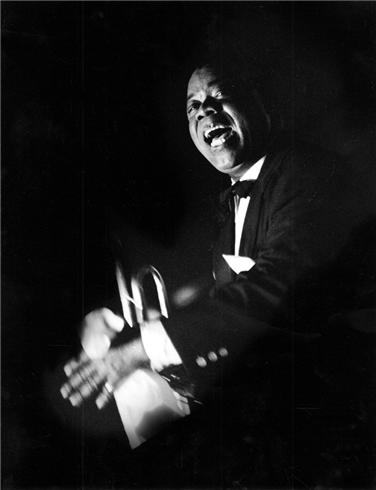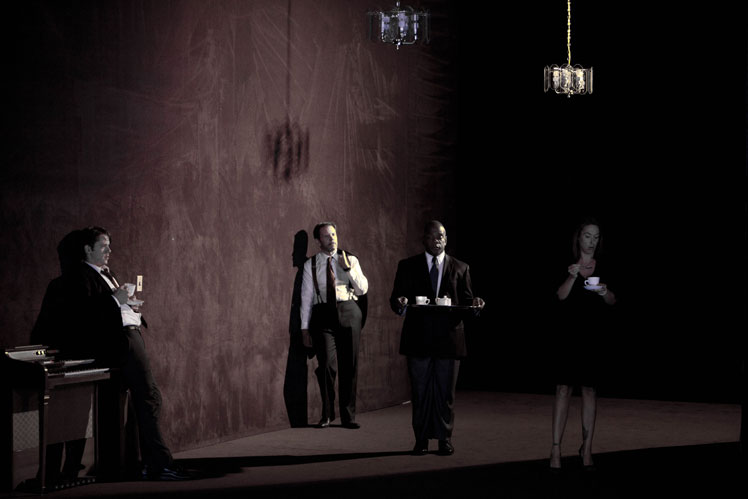In today’s Wall Street Journal I report from Boston on the Huntington Theatre Company’s new revival of William Inge’s Bus Stop, about which I had sharply mixed feelings. Here’s an excerpt.
* * *
Boston’s Huntington Theatre Company has revived “Bus Stop” in a production staged by Nicholas Martin, whose 2007 Huntington revival of Noël Coward’s “Present Laughter” moved to Broadway last season. I doubt that his “Bus Stop” will meet with the same good fortune, not because it doesn’t work on its own terms but because Mr. Martin’s staging, though undeniably effective, is false to the play’s nature. Inge called “Bus Stop” a comedy, and it contains more than enough funny moments to justify the label. But “Bus Stop” is a serious comedy, one in which pathos is never far from the surface, and Mr. Martin has chosen to direct the first two acts for laughter instead of truth. The result is a production that too often encourages the audience to laugh at the characters instead of with them, which diminishes both the characters and the play.
If you’ve never seen “Bus Stop,” it’s a “Grand Hotel”-like tale of a group of travelers who get caught in a blizzard and are forced to spend the night holed up in a small-town diner somewhere in Kansas. As they interact with three of the town’s residents and with one another, we gradually get to know the characters, all of whom are looking for love. One of them, Bo (Noah Bean), is a sexually inexperienced young cowboy who has fallen for Cherie (Nicole Rodenburg), a shopworn nightclub singer, and is trying to persuade her to come home to Montana with him. Also on hand are Virgil (Stephen Lee Anderson), Bo’s longtime sidekick; Grace (Karen MacDonald), the hard-bitten owner of the diner, who longs to lure the bus driver (Will LeBow) into the sack; Elma (Ronete Levenson), a bright but innocent teenager who waits tables for Grace and catches the eye of Dr. Lyman (Henry Stram), a Shakespeare-spouting drunk with an ugly penchant for chasing underage girls; and Will (Adam LeFevre), the town sheriff, a quiet gent who is tougher than he looks.
We are, in short, deep in the heart of Cliché Country–except that Inge writes about his eight stock-company characters with a compassionate and comprehending sympathy that makes each one seem as real as your next-door neighbor. This is where Mr. Martin goes wrong, for he has all too clearly encouraged the key members of the cast to overplay their parts, opting for broad caricature instead of laconic understatement (except in the last act, where the actors finally get in tune with the play and bring it to a satisfying close). It’s as though he doesn’t trust the audience to know when to be amused….
* * *
Read the whole thing here.
Archives for 2010
TT: Almanac
A sorrow’s crown of sorrows is remembering happier things.
Alfred, Lord Tennyson, “Locksley Hall”
TT: Yes, Virginia, another Pops interview…
 …but this one, if I do say so myself, is unusually interesting. Lee Mergner, the editor-in-chief of JazzTimes, interviewed me via e-mail a couple of months ago about the writing of Pops, and his questions were both wide-ranging and astute:
…but this one, if I do say so myself, is unusually interesting. Lee Mergner, the editor-in-chief of JazzTimes, interviewed me via e-mail a couple of months ago about the writing of Pops, and his questions were both wide-ranging and astute:
How do you avoid hagiography with a subject so remarkable as Armstrong?
By telling the truth about him. Louis Armstrong was a great and lovable man, but he wasn’t a saint, and he wouldn’t have wanted to be portrayed as one. That’s something he makes clear in his own autobiographical writings. It was immensely important to Armstrong to make sure that posterity would know the whole truth about him. That’s why he took care to preserve his personal papers, and why he spent so much time writing the letters and manuscripts in which he told his side of the story of his life. He wasn’t afraid of telling the truth about himself, and that inspired me to do the same.
The interview has just been posted on the magazine’s Web site and you can read it here.
TT: So you want to see a show?
Here’s my list of recommended Broadway, off-Broadway, and out-of-town shows, updated weekly. In all cases, I gave these shows favorable reviews (if sometimes qualifiedly so) in The Wall Street Journal when they opened. For more information, click on the title.
Warning: Broadway shows marked with an asterisk were sold out, or nearly so, last week.
BROADWAY:
• La Cage aux Folles (musical, PG-13, adult subject matter, reviewed here)
• Fela! (musical, PG-13, adult subject matter, closes Jan. 2, reviewed here)
• Million Dollar Quartet (jukebox musical, G, reviewed here)
OFF BROADWAY:
• Alfred Hitchcock’s The 39 Steps (comedy, G, suitable for bright children, original Broadway production reviewed here)
• Avenue Q (musical, R, adult subject matter and one show-stopping scene of puppet-on-puppet sex, reviewed here)
• The Fantasticks (musical, G, suitable for children capable of enjoying a love story, reviewed here)
IN ASHLAND, OREGON:
• Hamlet (Shakespeare, PG-13, closes Oct. 30, reviewed here)
• Ruined (drama, PG-13/R, violence and adult subject matter, closes Oct. 31, reviewed here)
• She Loves Me (musical, G, suitable for children capable of enjoying a love story, closes Oct. 30, reviewed here)
CLOSING SOON IN LOS ANGELES:
• The Glass Menagerie (drama, G, West Coast remounting of original New Haven/off-Broadway production, too dark for children, closes Oct. 17, off-Broadway run reviewed here)
• Ruined (drama, PG-13/R, West Coast remounting of original Chicago/off-Broadway production, violence and adult subject matter, closes Oct. 17, off-Broadway run reviewed here)
CLOSING NEXT WEEK IN SPRING GREEN, WISCONSIN:
• Major Barbara (serious comedy, G, too complicated for children, closes Oct. 2, reviewed here)
CLOSING FRIDAY IN SAN DIEGO:
• King Lear/The Madness of George III (drama, PG-13, playing in rotating repertory through Sept. 24, reviewed here)
CLOSING SATURDAY IN SPRING GREEN:
• The Circle (drama, PG-13, reviewed here)
TT: Almanac
“Memory is the diary that chronicles things that never have happened and couldn’t possibly have happened.”
Oscar Wilde, The Importance of Being Earnest
TT: (Euro)trashing an American classic
Starting today, I’ll be filing two weekly drama columns for The Wall Street Journal. In addition to my regular Friday column, I’m going to be writing a second review for the paper’s new Greater New York section that will appear on the day after the opening of a Broadway or off-Broadway play. While this review will not be published in the paper’s national edition, it will be accessible to anyone who reads the Journal online.
I inaugurate the new regime in this morning’s Journal with a review of the New York Theatre Workshop’s revival of Lillian Hellman’s The Little Foxes, starring Elizabeth Marvel. Here’s an excerpt.
* * *
 Lillian Hellman lived a radical life, both politically and sexually, but when it came to her art, she was as traditional as a nun. She wrote “well-made” melodramas in which every corner of the plot is neatly tucked in, and her down-to-earth craftsmanship is one reason “The Little Foxes” was and is so popular. Not only did it run for a year on Broadway, but it has been revived regularly ever since that first production closed in 1940. I’ve seen “The Little Foxes” performed many times, and all of those stagings have been both naturalistic and true to the play’s setting, Alabama in 1900. Now, though, the avant-garde has finally come knocking on Hellman’s door: Ivo van Hove, a Flemish director who specializes in iconoclastic remixes of classics, has given us a high-concept “Little Foxes.”
Lillian Hellman lived a radical life, both politically and sexually, but when it came to her art, she was as traditional as a nun. She wrote “well-made” melodramas in which every corner of the plot is neatly tucked in, and her down-to-earth craftsmanship is one reason “The Little Foxes” was and is so popular. Not only did it run for a year on Broadway, but it has been revived regularly ever since that first production closed in 1940. I’ve seen “The Little Foxes” performed many times, and all of those stagings have been both naturalistic and true to the play’s setting, Alabama in 1900. Now, though, the avant-garde has finally come knocking on Hellman’s door: Ivo van Hove, a Flemish director who specializes in iconoclastic remixes of classics, has given us a high-concept “Little Foxes.”
Mr. van Hove’s approach to the play is easily explained: It’s a modern-dress staging performed without southern accents on a minimalist set, accompanied by minimalist music. If you see a lot of Shakespeare or go to the opera more than once a year, you’ll have seen plenty such productions, and you’ll more than likely be familiar with the rest of the tricks in Mr. van Hove’s bag. Jan Versweyveld’s set, which is presumably intended to suggest a seven-figure Manhattan duplex, contains no furniture except for a Hammond organ in the corner and a video screen on the wall that is used to project offstage scenes. Kevin Guyer’s costumes mostly run to shades of black. All the performers have clearly been instructed to act in as up-to-date a manner as possible…
You are, perhaps, getting the point? The plot of “The Little Foxes,” in which the hateful members of a family of exploitative nouveau-riche tradesmen claw one another’s eyes out over a business deal, is–brace yourself–as contemporary as today’s headlines! Thank you, Mr. van Hove, for trotting out all the clichés in the postmodern book in order to tell us something about “The Little Foxes” that anyone with a quarter of a brain in his head could figure out on his own…
The really sad part is that Mr. van Hove has put together a stageful of class-A actors to enact his simple-minded take on “The Little Foxes.” Elizabeth Marvel and Cristin Milioti, who play Regina, the villainess-in-chief, and her soon-to-be-disillusioned daughter Alexandra, turn in performances of attention-seizing intensity that are as revelatory as the production itself is trite….
* * *
Read the whole thing here.
TT: Snapshot
Ingrid Bergman plays the title role in Ibsen’s Hedda Gabler, directed by Alex Segal and starring Michael Redgrave, Ralph Richardson, and Trevor Howard. The production was taped by the BBC in 1962 and broadcast in the United States on CBS in 1963. This performing version was adapted by Phil Reisman from Eva Le Gallienne’s translation:
(This is the latest in a weekly series of arts-related videos that appear in this space each Wednesday.)
TT: Almanac
“Many a man fails as an original thinker simply because his memory is too good.”
Friedrich Nietzsche, Human All-too-Human
